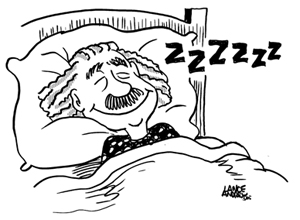 Bears have it made in the shade. They don’t have to work, they get to spend all day outside, they get to wear natural fur without fear of paint cans being flung at them and they get to sleep for six months out of the year. We should all be so lucky. While I have spent many a night envying the bear (don’t judge me), I never thought that a bear’s hibernation habits could ever lead to unlocking the key to deep space travel for humankind.
Bears have it made in the shade. They don’t have to work, they get to spend all day outside, they get to wear natural fur without fear of paint cans being flung at them and they get to sleep for six months out of the year. We should all be so lucky. While I have spent many a night envying the bear (don’t judge me), I never thought that a bear’s hibernation habits could ever lead to unlocking the key to deep space travel for humankind.
According to Brian Barnes of the Institute of Arctic Biology at the University of Alaska in Fairbanks, the black bears’ ability to hibernate could lead to several breakthroughs. One of them was in regards to medical trauma such as heart attacks, which creates “a problem of supply and demand.”
Your supply of oxygenated blood to your brain is quickly lowered but the demand stays high and you have to get to a hospital very quickly…
If we can uncover the way that hibernators turn down that metabolic demand… then one could imagine a therapy where you would – in somebody who is stricken – lower the metabolic demand to match that reduced supply.
Another potential breakthrough? Hibernation in space.
Though they are virtually immobile for five to six months, somehow they have tricked their tissue, their bones and muscle, to think that they are still doing work… The trick would be to find drugs that would emulate those same changes in humans.
In a lot of science fiction, cryogenic freezing is used as a plot device to suspend the crew of a vessel in animation for prolonged periods of time. Personally, I prefer the idea of an extended nap. Everybody loves a nap.
Link
 Gearfuse Technology, Science, Culture & More
Gearfuse Technology, Science, Culture & More



Couldn’t time dilation (which would result if the spaceship was traveling very close to the speed of light) also work to prevent people from aging during space travel?
This is what you call “news”?
This idea has been around at least 50 years, and we’re no closer to it than when Rod Serling dropped the ice cube with a goldfish inside into the fish bowl during one of his monologues. The fish swam, the bears slept and, apparently, so has hibernation research.